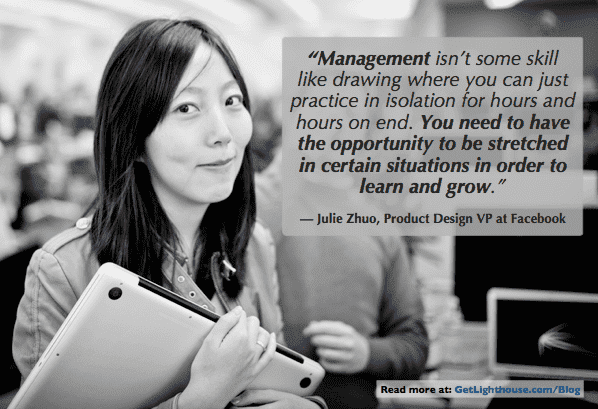"Management isn't some skill like drawing where you can just practice in isolation for hours and hours on end. You need to have the opportunity to be stretched in certain situations in order to learn and grow." - Julie Zhuo, Product Design VP at Facebook
Learning leadership skills can be a steep challenge. Much of what works is counter to our instincts. Like Zhuo highlights, it takes hands on experience to understand much of it.
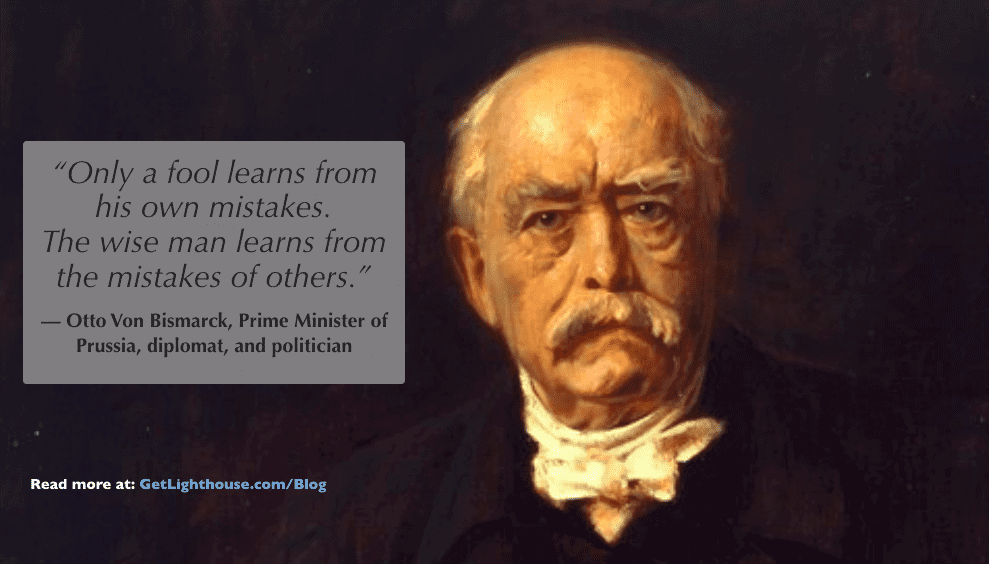
Learn from others.
Fortunately, you don't have to reinvent the wheel if you're a leader. The leadership stories and lessons of others can help you more quickly level up your skills.
Seeing what works (and doesn't) for others is a great way to build your own leadership style and toolkit. Over time, you'll find what fits your personality and role. This then helps you seek out more lessons that can specifically apply to you.
We've covered leadership stories from many leaders on the Lighthouse blog over time like Camille Fournier, Mark C Crowley, Kate Matsudaira, John Wooden, and a myriad of others in anecdotes within larger posts. Today, we get a little more personal.
Below are 3 leadership stories from my life that surprised me in their power. They're lessons I keep in mind regularly.
3 Leadership Stories to Help You be a Better Manager
When you're leading others, you quickly learn that there's a lot that changes. What you do, what you say, how you say things, and how you react are all watched by your team. Over time, you learn good things to do, key habits to remember, and what not to do.
These are 3 of my favorite leadership stories that proved to be "aha" moments for me:
- #1: There and back again, turning an A Player into a B Player
- #2: How a missed phone call made a great impression
- #3: The power of growth, even if they leave

Leadership Stories #1: There and back again, turning an A Player into a B Player
In a past company, we had a small team that worked remotely. We got together a few times a month, but otherwise relied on email and calls to stay on the same page.
This was great to allow everyone to be efficient and focused on their work.
Unfortunately, it also created management blind spots.
Over time, another leader and I noticed one of our best team members seemed to be disengaging. They didn't bring the same enthusiasm and extra touch to their work we previously saw.
In a one on one with their manager, we discussed their recent work. Did we need to let them go? What happened?
Neither of us knew the answer.
The epiphany: A lack of real communication
As we continued speaking we realized both of us had failed to check in with her. It had actually been months since either of us last checked in with her.
Realizing their drop in quality of work might just be our fault, I took responsibility. I reached out to them and immediately scheduled a 1 on 1. I'm very glad I did.
I started the 1 on 1 by apologizing that we hadn't been checking in with them. Then we started talking about how they were doing.
It was then I discovered that their interests had shifted and they wanted to make some small changes to their role. They also had different long term goals now, so what we thought was great tasks that furthered those goals, were actually wrong.
What's most amazing to me in retrospect is how quickly things turned around. After just two 1 on 1s where I listened and made some small changes, they started showing their past enthusiasm and quality work.
The Lesson:
From that point forward, I've always kept in mind that you can't take any of your good people for granted. You have to make time to check in on them, and assume if there's a problem it could just as much be you causing it as anything wrong with them.
And all it took was making time to listen and take action on what I heard.
Why it works:
For decades, great leaders have sworn by the value of effective 1:1s. Yet, there wasn't always qualitative evidence to back it up. Fortunately, now there is.
A study reported in Harvard Business Review in December 2016 found:
"Employees who got little to no one-on-one time with their manager were more likely to be disengaged. On the flip side, those who get twice the number of one-on-ones with their manager relative to their peers are 67% less likely to be disengaged.... And what happens when a manager doesn't meet with employees one-on-one at all? [They are] four times as likely to be disengaged as individual contributors as a whole, and are two times as likely to view leadership more unfavorably compared to those who meet with their managers regularly."
I learned the hard way what happens when you don't check in with a team member. They became disengaged, and it was because I wasn't making time for them.
Need help starting or making the most of your 1 on 1s? Here's where to start:
- Learn how to start and have awesome 1 on 1s by downloading our free ebook here.
- Learn what the most important topics are to discuss in your 1 on 1s here.
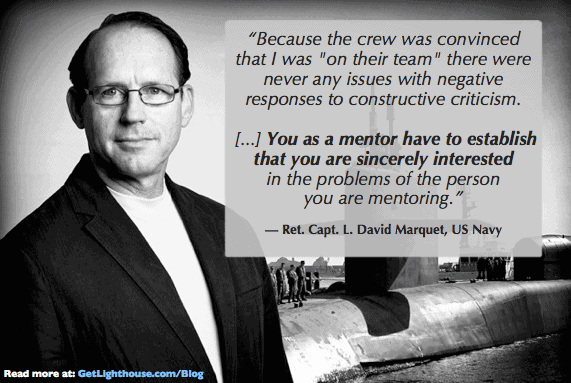
Leadership Stories #2: How a missed phone call made a great impression
The second leadership story, is not one I experienced first hand, but it's stuck with me ever since. I learned it from my father, who I'm lucky to have as a father and a mentor in business and leadership.
He told me this story during a catch up call shortly after it happened. Since learning the lesson, I've tried to always do the same to great effect, so sharing it with you today.
The phone call
One day, my father was meeting privately in his office with a staff member. They were discussing a number of issues important to them when the phone rang.
My father ignored it.
After 3 rings, she looked at him and asked, "Aren't you going to get that?"
He paused, and remarked, "No. I don't know whether that call is important or not, but it can wait. I do know this meeting is important."
Feeling valued, she got a big smile and they continued the conversation with new energy.
The Lesson:
What you pay attention to, and how you respond to things matters a great deal to your team.
If you meet with your people and let push notifications, texts, IMs, and calls constantly distract you, you're telling your team those things are more important than them.
When people don't feel valued, they won't trust you, or bother to bring issues to you unless they feel they will get your attention. It's a great way to end up in a constant fire fighting, reactive management mode.
Why it works:
When you show your people you value your time with them, you are much more likely to have strong communication and engagement with them.
Nothing sums this up better than this data from Gallup's "State of the American Manager" report:
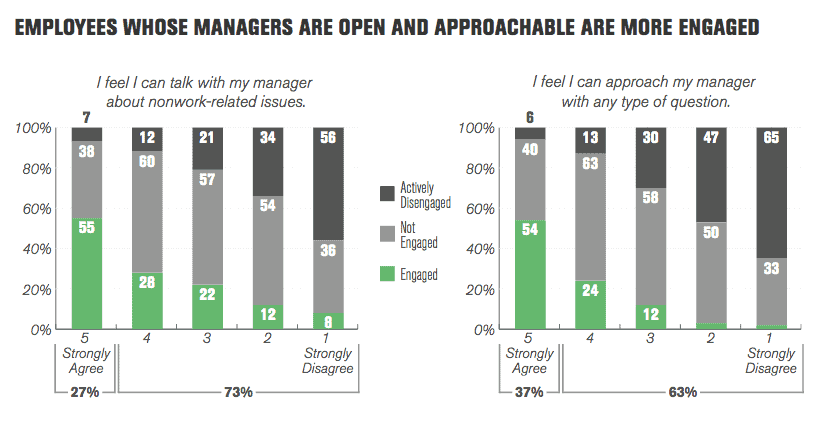
As you can see, if they don't feel like they can approach you, there's virtually no chance they're engaged.
When you let distractions pull you away from your time with your people, you're discouraging them from approaching you.
Go to airplane mode if you have to, or at least silence the notifications. You never know when not answering the phone will pay off with your team.
Want to become more approachable to your people?
- Get away from an open door policy which many leaders have found fails to lead to good outcomes.
- Break away from reactive management mode by following these tips.
- If you struggle to stay focused in your 1 on 1s, here's 5 ways to take notes effectively in these crucial meetings.
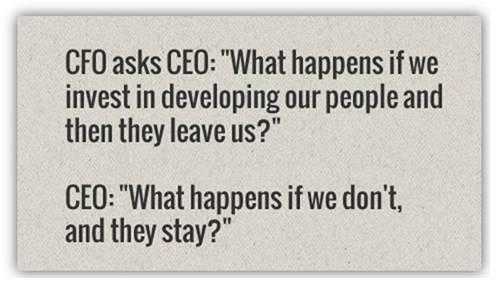
Leadership Stories #3: The power of growth, even if they leave
This third and final leadership story is the one that surprised me most. It was a big gamble at the time, and definitely worked out better than I expected.
One day I was having a one on one with a team member and they told me that they had a new career goal. Suddenly they wanted to head in a very different direction. Instead of doing business development (their current role), they wanted to become a product manager.
Now, this news was surprising and concerning for a few reasons:
- They were very good at business development.
- We needed the revenue and partnerships they built in this role.
- We didn't have any product management work available for them.
They were also one of our best people, so we did not want to lose them. However, it was clear they had given it a lot of thought. They had good reasoning for the change and were determined to do it whether we supported them or not.
The Gamble
Rather than try to convince them they shouldn't pursue their passion, I decided to embrace it.
I told them that if they kept doing a great job in their business development work, I would help them learn how to become a product manager. [Ed note: Before starting Lighthouse, I was a product manager myself]
At the time, I was afraid that with their change of interests, they'd start checking out of their BD role. I worried that any encouragement I gave on product management, will take away from the critical work we needed.
How wrong I was.
They actually did their best work after this conversation. For the next 18 months, they did their best work ever.
And all I had to do were some very simple low cost ways to support their learning:
- We bought them the best books on product management to read.
- Once a month we met to discuss anything they wanted to about product management, which also helped me see their progress in building their skills.
- I introduced them to other good product managers I knew to learn from them, too.
The Lesson:
I was going to lose this team member whether I helped them or not. However, because I helped them, they helped me by working hard while they used their time to learn and build the skills for their change.
Most of your team members will want to grow in ways that align with their current job or a promotion they want. As a manager, supporting them often takes you very little time and can really pay off in their morale and motivation.
Why it works:
Study after study after study shows that the #1 perk people want at work is growth and development. As just one example, here's the results of a study reported in Mary Meeker's Internet Trends report:
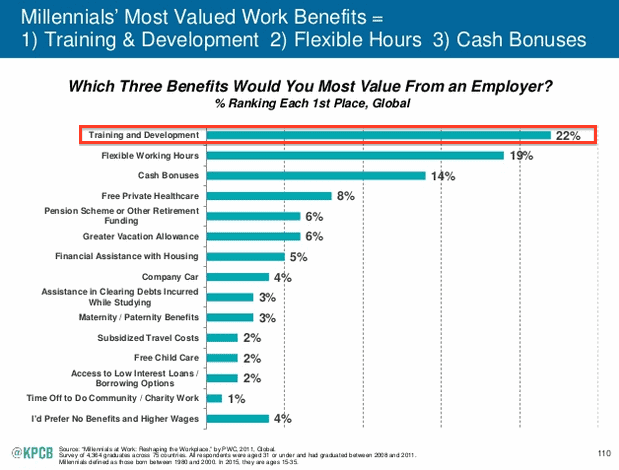
As I learned, even small efforts can mean a lot to your people. Even better, when you can align it to their work, it helps you retain them long term.
Not sure where to start to help grow your people?
- Here's 3 great approaches to starting a growth discussion.
- If you can't promote your people, then these tips are perfect for growth without promotions.
What are your favorite leadership stories you've learned from? Share one in a comment so we can all learn from it.
